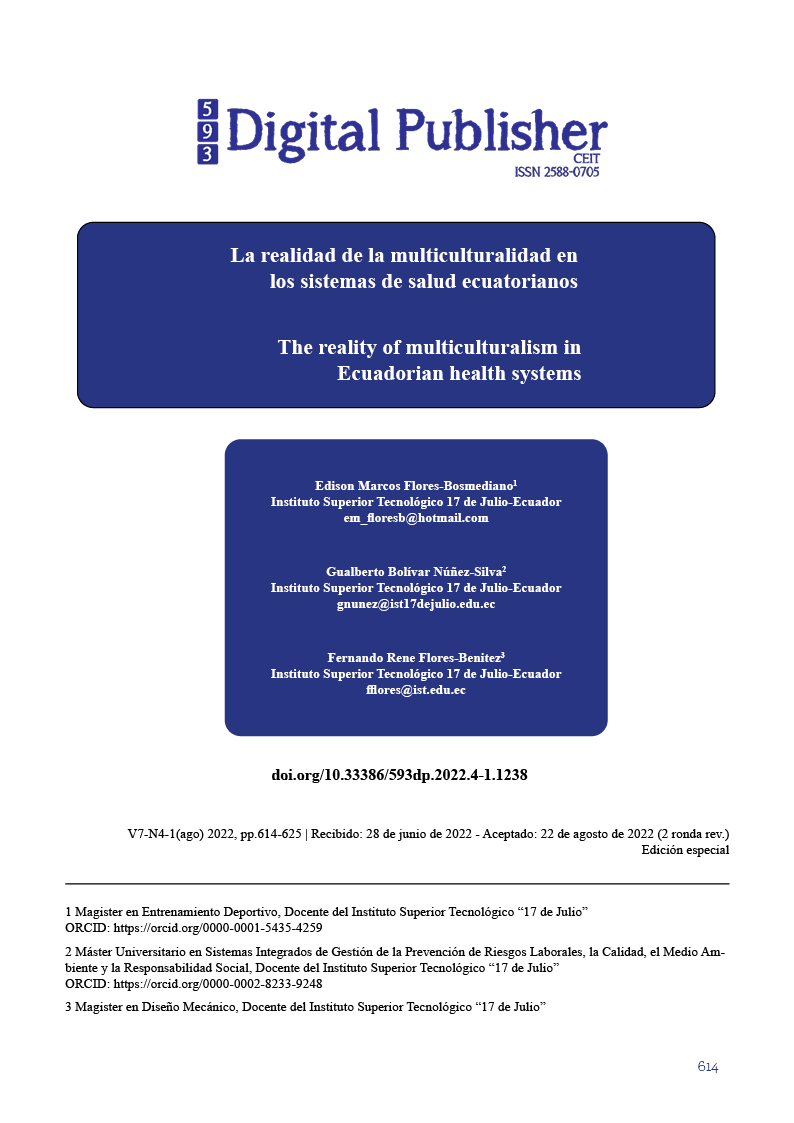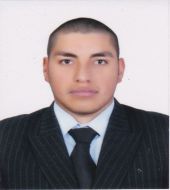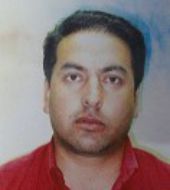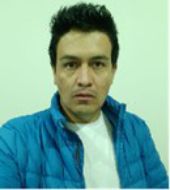The reality of multiculturalism in Ecuadorian health systems
Main Article Content
Abstract
For several decades, the Ecuadorian state and institutions have made visible and concerned about the country's ethnic communities, building laws, regulations, plans, among others. In that sense, this research aims to analyze the interaction of Ecuadorian health systems with ethnic communities and how their ancestral processes can be inserted into their policies. The methodology used has a qualitative approach, of a documentary type with a bibliographic approach, where different scientific articles, theses, books, documents of international and national organizations, constitutions, laws, among others, were consulted, there is a lot of relevant information which is very significant. , but it was necessary to take the information that supported the topic precisely. As results, the conceptualizations and characterizations of ethnicity, multiculturalism, the fundamental legal bases that support these communities and how the health factor has been treated in these communities were obtained, allowing the analysis of how the Ecuadorian health systems have interacted to date with the different ethnic groups of Ecuador. The main conclusion was obtained that, despite all the laws, regulations, and initiatives by the state, even in health centers the incorporation of traditional and complementary medicines is not observed, nor is there much interest on the part of members of the health sector. acquire the skills for its application.
Downloads
Article Details

This work is licensed under a Creative Commons Attribution-NonCommercial-ShareAlike 4.0 International License.
1. Derechos de autor
Las obras que se publican en 593 Digital Publisher CEIT están sujetas a los siguientes términos:
1.1. 593 Digital Publisher CEIT, conserva los derechos patrimoniales (copyright) de las obras publicadas, favorece y permite la reutilización de las mismas bajo la licencia Licencia Creative Commons 4.0 de Reconocimiento-NoComercial-CompartirIgual 4.0, por lo cual se pueden copiar, usar, difundir, transmitir y exponer públicamente, siempre que:
1.1.a. Se cite la autoría y fuente original de su publicación (revista, editorial, URL).
1.1.b. No se usen para fines comerciales u onerosos.
1.1.c. Se mencione la existencia y especificaciones de esta licencia de uso.
References
Amores, C., & Pérez, G. (2017). La pertenencia étnica y el acceso a los servicios de salud: Caso de indígenas y afrodescendientes ecuatorianos en el periodo 2006-2015. Revista Publicando, 4(11 (1)), 618-638. Obtenido de https://revistapublicando.org/revista/index.php/crv/article/view/602
Asamblea Nacional Constituyente. (2008). Constitución de la República del Ecuador. Quito. Obtenido de https://www.oas.org/juridico/pdfs/mesicic4_ecu_const.pdf
Astudillo, R. (2019). Interculturalidad y Salud: una mirada desde la perspectiva de la Medicina Familiar. En A. De Santis-Piras, & A. Verdugo-Sánchez, Salud, Interculturalidad y Buen Vivir. Respeto a la diversidad y mutuo beneficio en el intercambio de saberes y experiencias (págs. 61-77). Cuenca, Ecuador: Ubiversidad Politecnica Salesiana. Obtenido de http://dspace.ups.edu.ec/handle/123456789/18379
Bautista, E., Vangehuchten, L., & Duque, V. (2017). La atención sanitaria intercultural en Ecuador: un proyecto de investigación para las carreras de medicina y enfermería. Medisan, 21(10), 3111-3122. Obtenido de https://www.medigraphic.com/pdfs/medisan/mds-2017/mds1710q.pdf
Confederación de Nacionalidades y Pueblos Indígenas del Ecuador, CONAIE. (2007). Propuesta de la CONAIE frente a la Asamblea Constituyente. Obtenido de https://biblio.flacsoandes.edu.ec/libros/109339-opac
Fernández, S., Vilela, W., & Durán, A. (2019). Dimensión multicultural en el código de la niñez y adolescencia desde una perspectiva educativa. Revista Universidad y Sociedad, 11(1), 208-217. Obtenido de http://rus.ucf.edu.cu/index.php/rus
Gómez-Luna, E., Fernando-Navas, D., Aponte-Mayor, G., & Betancourt-Buitrago, L. (2014). Metodología para la revisión bibliográfica y la gestión de información de temas científicos, a través de su estructuración y sistematización. DYNA, 81(184), 158-163. doi:https://doi.org/10.15446/dyna.v81n184.37066
Grunauer, G., & Cortón, B. (2019). Formación académica de los profesionales de la salud. Promoción de salud e interculturalidad. Electrónica Formación y Calidad Educativa (REFCalE), 7(1), 15-28. Obtenido de http://refcale.uleam.edu.ec/index.php/refcale/article/view/2973
Madrid, A. (2019). La construcción del Estado plurinacional ecuatoriano, más allá del reconocimiento constitucional: descolonización, autonomías e interculturalidad. Antropología:. Cuadernos de Investigación(22), 14-31. Obtenido de https://dialnet.unirioja.es/servlet/articulo?codigo=7313815
Mozo, M. (2017). Salud e interculturalidad en Ecuador: las mujeres indígenas como sujetos de intervención de las políticas públicas. Comparative Cultural Studies: European and Latin American Perspectives, 2(2), 55-65. Obtenido de 10.13128/ccselap-20826
Naciones Unidas. (2007). Declarracion de las Naciones Unidas sobre los derechos de los pueblos indigenas.
Organización Mundial de la Salud, OMS. (2013). Estrategia de la OMS sobre Medicina Tradicional 2014-2023. Informe. Obtenido de https://apps.who.int/iris/bitstream/handle/10665/95008/9789243506098_spa.pdf
Rojas, R. (2013). Guía para la realización de investigaciones sociales. España: Plaza y Valdez Editores. Obtenido de https://raulrojassoriano.com/cuallitlanezi/wp-content/themes/raulrojassoriano/assets/libros/guia-realizar-investigaciones-sociales-rojas-soriano.pdf
Secretaría Nacional de Planificación y Desarrollo - Senplades. (2017). Plan Nacional para el Buen Vivir 2017-2021. Quito - Ecuador. Obtenido de https://observatorioplanificacion.cepal.org/sites/default/files/plan/files/EcuandorPlanNacionalTodaUnaVida20172021.pdf
Sica, G. (2017). Las sociedades indígenas del Tucumán colonial: una breve historia en larga duración. Siglos XVI a XIX. En S. Bandieri, & S. Fernández, La historia nacional en perspectiva regional. Nuevas investigaciones para viejos problemas, (págs. 41-82). Buenos Aires: Teseo. Obtenido de https://d1wqtxts1xzle7.cloudfront.net/56514928/sociedades_indigenas_del_Tucuman._Sica-libre.pdf?1525785715=&response-content-disposition=inline%3B+filename%3Dsociedades_indigenas_del_Tucuman_Sica_pd.pdf&Expires=1653686912&Signature=Q~brDG-Z~xSRTYdRt2I-Aae




